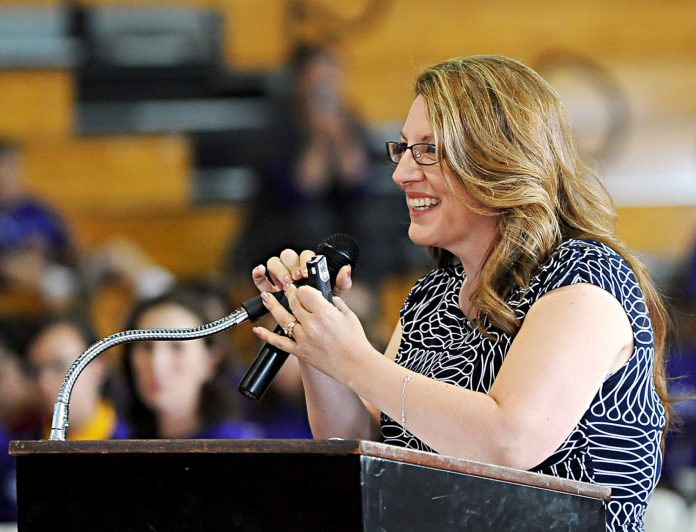
Just as a county-authorized charter school has locked down a short-term lease for its new Morgan Hill site, local school district officials have filed a lawsuit in a final attempt to stop them from opening up classes for the 2015-16 school year.
Leaders of Voices College-Bound Language Academy have leased space at the Advent Lutheran Church on Murphy Avenue, where they plan to serve local students for at least one year at the new Voices-Morgan Hill.
“The church leaders have been so supportive. We’re just really pleased with the partnership,” said Frances Teso, founding principal of Voices flagship school in San Jose who is also spearheading the expansion into Morgan Hill. “We’ve hit all of our marks. We found our short-term facility and we’ll be able to open on time now.”
However, attorneys for the Morgan Hill Unified School District—under the direction of Superintendent Steve Betando—have filed a civil case against the Santa Clara County Office of Education and its Board of Education. In the court documents, they are challenging the county board’s decision-making process for approving the charter petition, which came to them on appeal late last year after the MHUSD board’s denial.
The SCCOE has not yet been formally served with the lawsuit, but they are aware it is coming, according to Ken Blackstone, SCCOE’s director of media and communications. The court case, however, was listed as a closed session item on the SCCBOE’s May 6 agenda.
“We still have concerns about the county board approving this charter when the county staff found them demonstrably unlikely to succeed and (county staff is) having real problems with their charter,” Betando said. “We filed a writ of mandate against the county.”
In those court documents, filed April 29 in Santa Clara County Superior Court, SCCBOE and SCCOE are listed as defendants with Voices named as a real party in interest.
“The SCCBOE abused its discretion, and failed to perform its ministerial duty to consider whether the petitioners were demonstrably unlikely to successfully implement the program in the area of financial administration,” reads part of MHUSD’s legal argument.
MHUSD attorneys with the Mountain View-based law firm Burke, Williams & Sorensen, LLP point out financial shortcomings of Voices that were identified by county staff in their review but ignored by the county board, which voted 6-1 in approving the petition in November 2014.
At that time, the county board attached two conditions to the three-year charter petition, both of which have been met by Voices leaders. The charter school reached its 112 projected enrollment by April 1 and obtained a facility by July 1.
Attorneys for MHUSD contend, among other things, that the added cost of leasing a private facility was never taken into account by the county board since Voices originally intended to use a Proposition 39 facilities request to gain access to an MHUSD site. Under Prop 39, the district must allocate classroom space in an existing school for a charter to operate, but only if space is available.
“We are still pursuing our options to make sure that we have facilities offered to us in the future, which is a right in California with Proposition 39,” said Teso, who abandoned negotiations with district officials after it was argued that the charter organization had not submitted the required number of parent signatures to justify a Prop 39 request. “The process itself has ended at that spot (but) we’re still working in the background to make sure this doesn’t happen in the future.”
Meanwhile, the district, which has successfully fought off petitions from two different charter management companies (Navigator and Rocketship), neither of which received county approval to overturn the MHUSD board’s decision, is trying to make sure Voices has no future in Morgan Hill.
“It didn’t surprise me that they found (a private location), but I’m a little concerned that it’s also a religious facility. There’s always that question of separation of church and state,” said Betando, who added the district “received support and direction from board members in closed session to pursue legal action against SCCOE.”
That support was apparently not unanimous from the seven-member board.
“It’s unfortunate that there are people in our organization who can’t focus on student achievement and instead choose to spend money on lawsuits,” said Trustee Rick Badillo, who has been at odds with the district over a number of key issues.
Board President Bob Benevento said he had “no comment” on any pending litigation.
But Trustee Gino Borgioli, a first-year board member, added that he too was not in favor of the lawsuit.
“I would rather spend money to strengthen our own schools and bring up student achievement than to spend the money on a lawsuit that the county has already made a decision on,” Borgioli said.
The district’s lawsuit, which could cost up to $60,000, also “seeks a declaration that the SCCOE and the SCCBOE are obligated to revoke the charter after it failed ‘to successfully negotiate and execute the (Memorandum of Understanding) contract by Jan. 1, 2015.’” The legal documents note that a previous court of appeal “concluded that an authorizing agency could be compelled…to revoke a charter where the charter school violates one of the conditions of granting the charter.”
Additionally, attorneys argue that the district is entitled to “declaratory relief” due to the “SCCBOE’s failure to comply with its legal duty to evaluate and vote to grant or deny the charter petition” under provisions of the state education code.
The SCCOE recently settled a lawsuit filed by four other local school districts claiming that the SCCBOE overstepped its authority when it approved petitions for 20 Rocketship charter schools in Dec. 2011. In that settlement, Rocketship leaders agreed to slow their expansion of schools within the county and stop it altogether in some areas.







